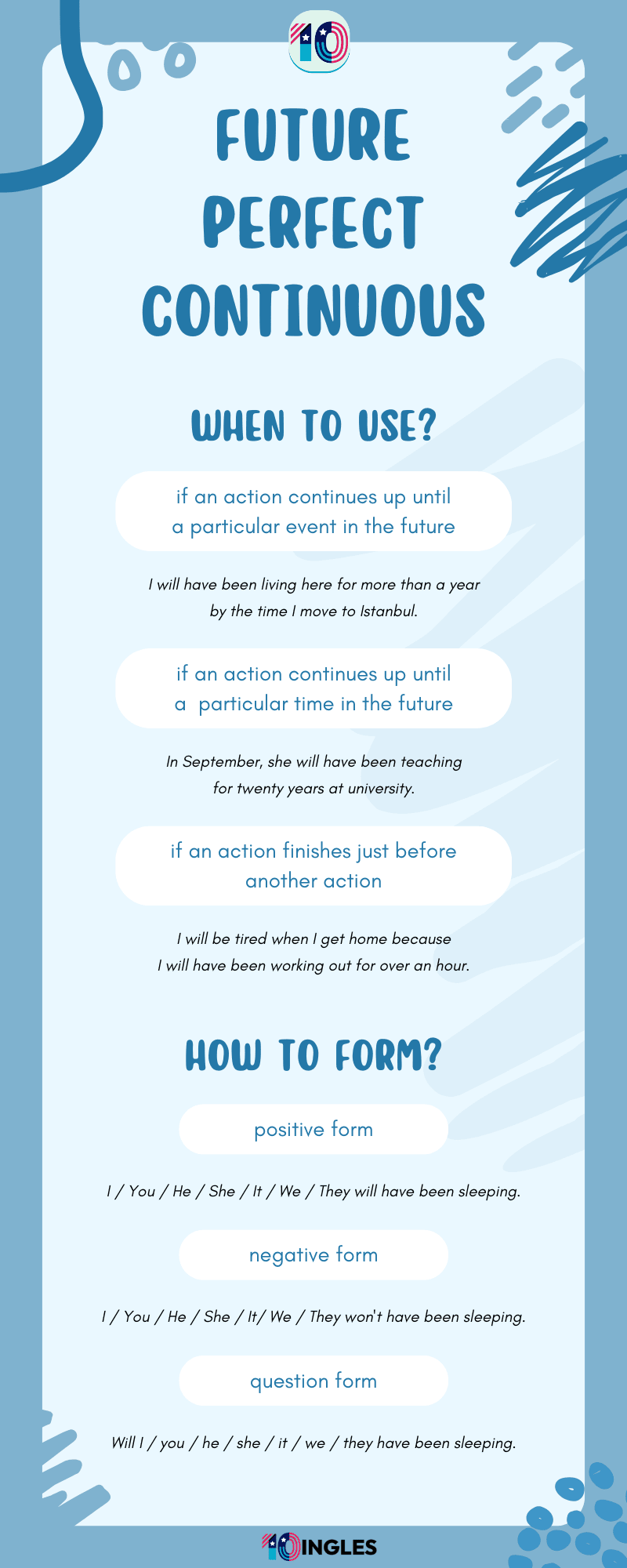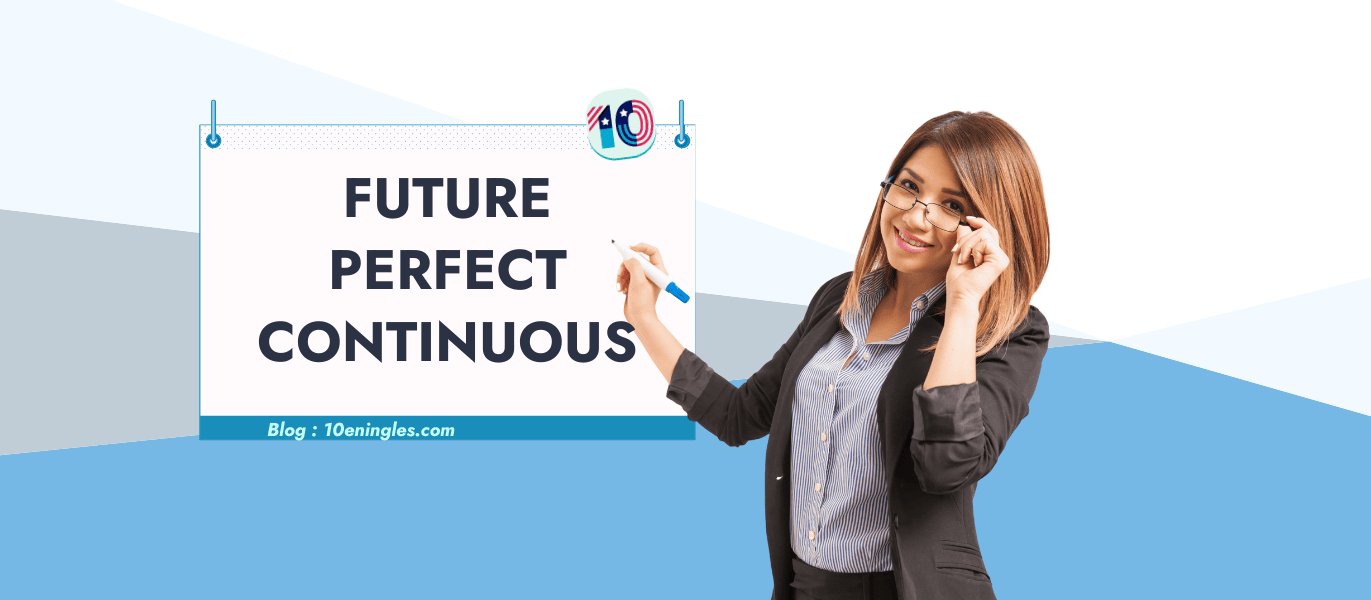El año que viene harán 10 años que estudio inglés — eso es Future Perfect Continuous (Futuro Perfecto Continuo en inglés). Para este tiempo son importantes dos cosas: un momento concreto en el futuro y una acción que durará hasta ese momento. Este tiempo se usa en inglés con poca frecuencia, pero es útil saberlo: es bonito y enriquecerá tu habla.
Future Perfect Continuous Tense, o Future Perfect Progressive Tense, es el tiempo futuro perfecto continuo. ¡Continuo y además perfecto! ¿WHAAAT? En español no hay un análogo para el Future Perfect Continuous, solo usamos un tiempo futuro.
Vamos a analizar las reglas del Future Perfect Continuous, a entender su lógica y a aprender en qué casos se debe usar este tiempo.

- Formación de oraciones en Future Perfect Continuous Tense
- Future perfect continuous en afirmativo
- Future perfect continuous en negativo
- Futuro perfecto continuo interrogativo
- Casos de uso del Futuro Perfecto Continuo
- Marcadores de tiempo del Futuro Perfecto Continuo
- Dificultades: cómo no confundirlo con otros tiempos
- Ejemplos de Futuro Perfecto Continuo (Future Perfect Continuous Tense)
- Ejercicios inglés Future Perfect and continuous
Formación de oraciones en Future Perfect Continuous Tense
Así es como se forma el Futuro Perfecto Continuo:

- Bob will have been waiting for more than two hours when Mary’s plane finally arrives. — Bob llevará esperando a Mary más de dos horas cuando su avión finalmente aterrice.
- They will have been talking for over an hour by the time Mary arrives. — Llevarán hablando más de una hora para cuando Mary llegue.
A los principiantes en Future Perfect Continuous lo que más les cuesta es escribir la terminación -ing de los verbos y la conjugación del verbo to be con diferentes pronombres. Vamos a repasar estos puntos difíciles.
Reglas para escribir la terminación -ing de los verbos
Normalmente, al verbo simplemente se le añade la terminación -ing:
- to play (jugar) → playing
- to laugh (reír) → laughing
- to do (hacer) → doing
Pero hay algunas excepciones:
Si el verbo termina en la vocal -e, se elimina:
- to bake (hornear) → baking
Cuando el verbo termina en -ie, estas dos letras se sustituyen por una Y:
- to lie (mentir) → lying
Si el verbo termina en una sola consonante, precedida de un sonido vocálico acentuado, la consonante final se duplica:
- to beg (suplicar) → begging
- to begin (comenzar) → beginning
- to regret (lamentar) → regretting
Mary and Bob will have been living together for 5 years by the time their son is 3 years old. — Mary y Bob llevarán viviendo juntos 5 años para cuando su hijo tenga 3 años.
We will have been driving for over three days straight when we get to the village. — Llevaremos conduciendo más de tres días seguidos cuando lleguemos al pueblo.
Future perfect continuous en afirmativo
Vamos a ver cómo se forma una afirmación en Futuro Perfecto Continuo y veamos ejemplos de oraciones afirmativas en este tiempo.
| Sujeto: sustantivo o pronombre | Verbo auxiliar to be | Verbo con terminación -ing: |
|---|---|---|
| I he, she, it Bob (he) Mary (she) dog (it) you, we, they students (they) | will have been | working, eating, sleeping |
- Mary will have been working as a teacher for three years by next year. — Mary llevará trabajando como profesora tres años para el año que viene.
- Bob will have been teaching at the university for more than a year by the time he leaves for Spain. — Bob llevará enseñando en la universidad más de un año para cuando se vaya a España.
Future perfect continuous en negativo
Una oración negativa en Futuro Perfecto Continuo se forma así:
| Sujeto: sustantivo o pronombre | Verbo auxiliar + partícula not | Verbo con terminación -ing: |
|---|---|---|
| I he, she, it Bob (he) Mary (she) dog (it) you, we, they students (they) my family and I (we) | will not have been | working, eating, sleeping |
- Bob will not have been waiting for more than two hours when Mary’s plane finally arrives. — Bob no llevará esperando más de dos horas cuando el avión de Mary finalmente aterrice.
- By the time Bob retires, he won’t have been working in this company for 20 years. — Para cuando Bob se jubile, no llevará trabajando en esta empresa 20 años.
Futuro perfecto continuo interrogativo
Aprendamos a formar oraciones interrogativas generales en Futuro Perfecto Continuo:
| Verbo auxiliar | Sujeto: sustantivo o pronombre | Verbo auxiliar | Verbo con terminación -ing: |
|---|---|---|---|
| Will | I he, she, it Bob (he) Mary (she) dog (it) you, we, they students (they) my family and I (we) | have been | working, eating, sleeping |
- Will they have been playing football for two hours when I come to the field? — ¿Llevarán jugando al fútbol dos horas cuando yo llegue al campo?
- Will you have been waiting for more than two hours when Mary’s plane finally arrives? — ¿Llevarás esperando más de dos horas cuando el avión de Mary finalmente aterrice?
Casos de uso del Futuro Perfecto Continuo
El Futuro Perfecto Continuo se usa cuando se necesita hablar de una acción que durará durante un tiempo hasta un momento (o acción) determinado en el futuro. Es muy importante hacer hincapié en que la acción durará.
- Bob and Mary will have been dating for 5 years by next year. — Bob y Mary llevarán saliendo 5 años para el año que viene.
- I will have been learning English for one year when I pass the IELTS. — Llevaré aprendiendo inglés un año cuando haga el IELTS.
- We are leaving for Spain in January. When you visit us in spring, we will have been staying in Spain for three months. — Nos vamos a España en enero. Cuando nos visites en primavera, llevaremos viviendo en España tres meses.
- When Bob finishes his English course, will he have been living in London for over a year? — Cuando Bob termine su curso de inglés, ¿llevará viviendo en Londres más de un año?
Marcadores de tiempo del Futuro Perfecto Continuo
Las palabras-marcador, palabras-ancla o palabras auxiliares indican el tiempo Futuro Perfecto Continuo.
| Inglés | Español |
|---|---|
| for | durante |
| by | para |
| next year | el año que viene |
| when | cuando |
Es importante saber que después de by, when y otras conjunciones temporales no se usa el tiempo futuro, solo el presente.
Dificultades: cómo no confundirlo con otros tiempos
Verbos de estado
Hay verbos que no se usan en la forma continua Continuous, en inglés se llaman stative verbs. Expresan procesos mentales, sentimientos — lo que ocurre dentro de nosotros.
Aquí tienes ejemplos de estos verbos: to want (querer), to cost (costar), to seem (parecer), to need (necesitar), to care (importar), to exist (existir), to like (gustar), to love (amar), to hate (odiar), to fear (temer), to envy (envidiar), to wish (desear), etc.
- ❌ Bob’s firm will have been existing for over two years.
- ✅ Bob’s firm will have existed for over two years. — La empresa de Bob existirá desde hace más de dos años.
Future Perfect Continuous vs Future Continuous
| Future Perfect Continuous | Future Continuous |
|---|---|
| Especifica el intervalo de tiempo durante el cual la acción va a durar. | No es importante el período de tiempo durante el que la acción va a durar. |
| By the evening, I will be tired because I will have been exercising for 5 hours. A la noche estaré cansado porque habré estado haciendo ejercicio durante 5 horas. | I will be tired because I will be exercising so hard. Estaré cansado porque estaré ejercitándome con tanta intensidad. |
Future Perfect Continuous vs Future Perfect
| Future Perfect Continuous | Future Perfect |
|---|---|
| Destacamos la duración de la actividad. | Hacemos hincapié en el resultado de la acción. |
| By the end of the day, Mary will have been reading for 5 hours. Al final del día, Mary habrá estado leyendo durante 5 horas. | By the end of the day, Mary will have read 500 pages of the book. Al final del día, Mary habrá leído 500 páginas del libro. |
Ejemplos de Futuro Perfecto Continuo (Future Perfect Continuous Tense)
Hemos analizado el tiempo Future Perfect Continuous o Futuro Perfecto Continuo. Ahora ya sabes:
- Qué es el tiempo Futuro Perfecto Continuo y cómo se forma;
- Cómo formar una oración afirmativa, negativa e interrogativa;
- Cómo añadir la terminación -ing a los verbos;
- Cuándo se usa el Futuro Perfecto Continuo;
- Las palabras-marcador del Futuro Perfecto Continuo;
- Los verbos de estado del Futuro Perfecto Continuo y cómo usarlos en este tiempo;
- Cómo diferenciar el Futuro Perfecto, el Futuro Perfecto Continuo y el Futuro Continuo.
Vamos a practicar. Intenta cambiar correctamente el verbo entre paréntesis. Más abajo daremos las respuestas correctas, pero no mires antes.
- I (clean) up all that mess in the house for an hour by the time you get here to help me.
- My daughter likes reading. By the end of the week, she (read) the books by Lev Tolstoy for a month.
- By the end of next month, Mr Levin (teach) history for 30 years at our school.
- The teams (play) for almost an hour by the time we get to the stadium.
Respuestas Correctas
2. My daughter likes reading. By the end of the week, she will have been reading the books by Lev Tolstoy for a month.
3. By the end of next month, Mr Levin will have been teaching history for 30 years at our school.
4. The teams will have been playing for almost an hour by the time we get to the stadium.
Ejercicios inglés Future Perfect and continuous
Se ha demostrado que uso de juegos educativos puede mejorar la comprensión de los estudiantes sobre el tiempo futuro perfecto continuo.
- №1. Rellena los espacios.
Elige la forma correcta del verbo:
- By next week, she _______ (to work) at this company for five years.
- They _______ (to wait) for the bus for over an hour by the time it arrives.
- _______ he _______ (to play) football for two hours by 6 PM?
- № 2. Encuentra el error
- By 8 PM, I will has been cooking for two hours.
- She will not been working here for a year by the time she leaves.
- Will they have being playing chess for three hours by the time we arrive?
- № 3. Construye oraciones
- She / to study / English / for three years / by the end of next month.
- By next year / we / to live / in this house / for ten years.
- He / to wait / for her / for two hours / by 5 PM.
Respuestas Correctas
1.2 will have been waiting
1.3 Will he have been playing
2.1 By 8 PM, I will have been cooking for two hours
2.2 She will not have been working here for a year by the time she leaves
2.3 Will they have been playing chess for three hours by the time we arrive
3.1 She will have been studying English for three years by the end of next month
3.2 By next year, we will have been living in this house for ten years
3.3 He will have been waiting for her for two hours by 5 PM


Comentarios